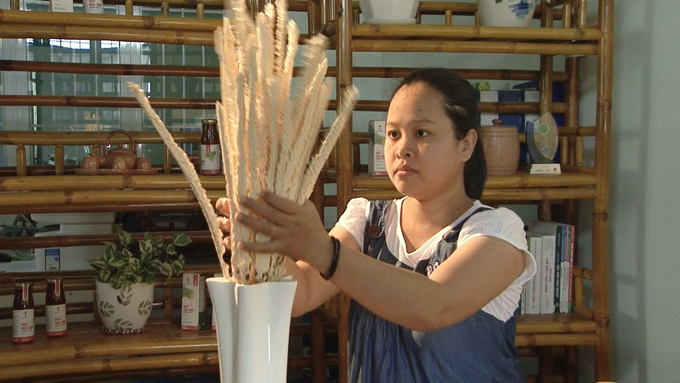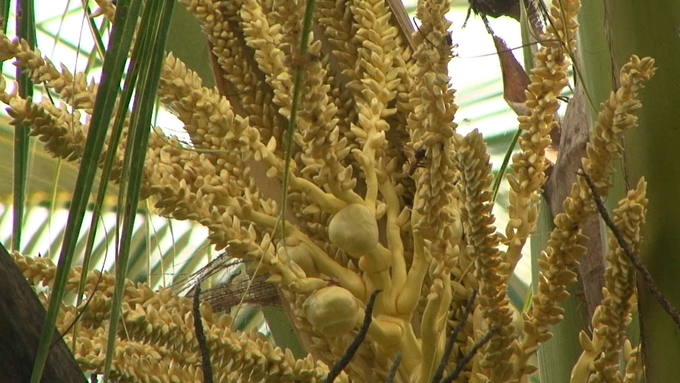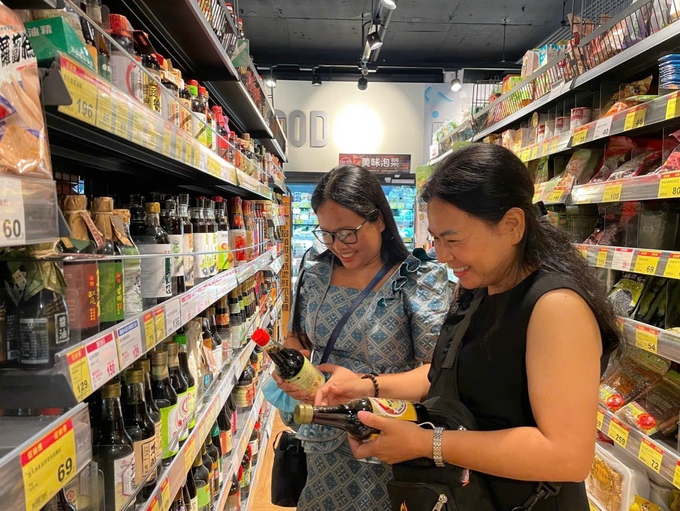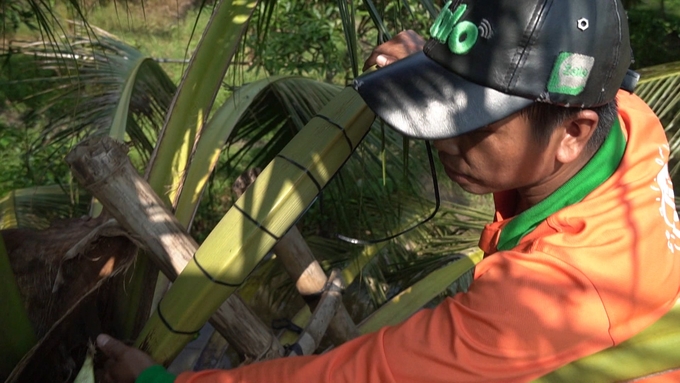May 19, 2025 | 22:47 GMT +7
May 19, 2025 | 22:47 GMT +7
Hotline: 0913.378.918
May 19, 2025 | 22:47 GMT +7
Hotline: 0913.378.918
Currently, Vietnam ranks 7th in the world in coconut growing area with about 175,000 hectares, concentrated mainly in the Mekong Delta. Tra Vinh province alone has about 23,600 hectares of coconut garden area. Here, farmers mainly grow coconuts for fruit sales. Therefore, there were times that they encountered many difficulties when the price of coconuts fluctuated, sometimes plummeted to about VND 25,000 per a dozen (equivalent to 12 fruits), making farmers' income more unstable.

Mrs. Thach Thi Chal Thi, a daughter of Tra Vinh, successfully enhanced the value of coconut trees. Photo: Ho Thao.
Originally from a farming family, Mrs. Thach Thi Chal Thi, a daughter of coconut land in Tieu Can district, Tra Vinh province, partly understands her family’s hardships. The fact that her parents and people in her hometown lost revenue after putting in so much effort motivated her to find ways to enhance the value of this rustic plant.
In 2018, after graduating with a Master's degree in Food Technology from Ho Chi Minh City University of Technology, with a special love for coconut trees, she decided to give up her job in the city to return to her hometown and research a new product from coconut trees. Based on reference materials and specialized knowledge, Mrs. Chal Thi chose nectar from coconut flowers as a start-up product because of the rich raw material sources in her hometown.
“Coconut nectar has been produced for a long time in countries such as Thailand and the Philippines. It has a sweet taste and a scent of coconut flowers, and it is very suitable for dieters and diabetics. Not only that, but this nectar is also rich in minerals and nutrients. Coconut nectar contains 10 times more minerals than coconut water and contains iron, fiber, and protein. Additionally, each coconut flower can be exploited many times while the value is much higher than selling the fruit," Mrs. Chal Thi said.

According to research, coconut nectar has many minerals that are beneficial for dieters and diabetics. Photo: Ho Thao.
However, the journey to bring this product to the market was not easy for Mrs. Chal Thi. The biggest challenge is convincing people to sell coconut flowers as raw materials. Many people were concerned that the exploitation of coconut flowers would affect the growth of the tree. Some people even scolded Mrs. Chal Thi for being like a "foreigner" who often "buys young fruits and young pineapples" from people.
"At that time, I felt very sad and wanted to give up. However, thanks to my husband, who was also determined and always by my side to encourage me to overcome the initial difficulties, we could have today," Mrs. Chal Thi said.
According to the female Master, reports from the Philippines and Sri Lanka, countries with a lot of experience in the field of coconut nectar exploitation, have proven that coconut trees still continue to flower and fruit after nectar collection, and the time from flowering to fruiting is 11 months. Types of coconuts, such as native coconut, Siamese coconut, and macapuno, all have the ability to yield nectar.

The first batch of 20,000 bottles of coconut nectar drink was officially exported to the US market. Photo: Ho Thao.
The nectar collection process requires workers to climb trees to select coconut flowers that are still in the cat's tongue. Then, they use the plant to "massage," which means patting the flower twice a day. If the flower is of good quality, each flower can yield 1–1.5 liters of nectar/day. For massage techniques, moderate percussion force should range from 10 to 20 Newtons. Each type of coconut flower has different sizes, so only after 2 months of working do workers feel familiar and proficient in their way of doing it.
After harvesting fresh nectar, the product is processed at the factory managed by Mr. Pham Dinh Ngai (Chal Thi's husband) through the pre-filtration and fine-filtration processes. Coconut nectar is created at a temperature of 190oC for 4 hours. This product is well received by the market and favored by domestic and international consumers.

The worker massages the coconut twice a day. Each tree yields 1–1.5 liters of nectar. Photo: Ho Thao.
As of now, the company has six main products, including coconut nectar drink, coconut nectar soy sauce, SokFarm coconut nectar, fermented coconut nectar, coconut nectar cocoa beans, and coconut nectar vinegar. These products have been present in more than 30 provinces and cities in the country and are also officially exported to international markets such as Japan, the Netherlands, Germany, and the US.
Recently, Mr. Pham Dinh Ngai, CEO of Tra Vinh Farm Co., Ltd. (SokFarm), happily announced that the company had just officially exported an order of 20,000 bottles of fresh coconut nectar drink (250 ml/bottle) under the brand name "Tra Vinh Specialty” to the US market. The company is expected to export 20,000–40,000 bottles of fresh coconut nectar drink (5-star OCOP product) to the US every month after the first successful order.

The representative of SokFarm Company received a certificate of merit from the Minister of Agriculture and Rural Development. Photo: HT.
"We aim to develop SokFarm as a community business because we started a business in our homeland. In the future, we will continue to diversify our products to reach more consumers,” Ms. Chal Thi shared.
Tra Vinh, with a large coconut-growing area, currently ranks 2nd nationwide, just behind Ben Tre province. The official export of fresh coconut nectar drink to the US is not only a significant milestone but also opens up new opportunities, helping to increase the value and popularize Tra Vinh's coconut specialty products in the international market.
Translated by Huyen Vu Thu

(VAN) Minister of Agriculture and Environment Do Duc Duy held a meeting with Soopakij Chearavanont, Chairman of C.P. Group, on May 15.
/2025/05/16/3800-0-nongnghiep-143756.jpg)
(VAN) Suntory PepsiCo Vietnam coordinated with the Ministry of Education and Training to implement an education program on water conservation, reaching nearly 1 million primary school students nationwide.

(VAN) Vietnam’s TH Group officially put its high-tech fresh milk processing plant into operation in the Russian Federation, marking a historic moment as the first TH true MILK cartons were produced in Russia.

(VAN) Use of high-quality broodstock and biotechnology is regarded as the most effective approach to ensuring sustainable and economically viable shrimp aquaculture ahead of climate change and the emergence of increasingly intricate disease patterns.

(VAN) Carbon farming is a form of agricultural practices that helps absorb more greenhouse gases than it emits, through smart management of soil, crops, and livestock.

(VAN) This is a key content of the Memorandum of Understanding recently signed between the Vietnam Fisheries Society and Kunihiro Inc of Japan.

(VAN) To achieve the goal, local authorities and businesses in Kon Tum province have fully prepared the necessary conditions for the new Ngoc Linh ginseng planting season.